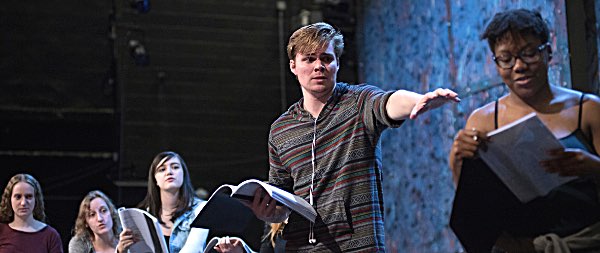- By Lindsey White
- Entertainment
 Print
Print 
In the not-so-distant future, survivors of a global nuclear disaster band together in grassroots theatrical troupes. For the characters of "Mr. Burns, a post-electric play" by Anne Washburn, it's not entertainment at stake, but survival: theirs is a reality in which remembered dialogue from "The Simpsons" is traded as currency, and where pop songs and commercial parodies provide the only emotional connections to a world that no longer exists.
"'Mr. Burns' is dark, witty, and powerful. It is the type of show that lingers," says Kilburn.
Presented in three acts, "Mr. Burns" takes the audience from the immediate aftermath of the nuclear catastrophe, in which survivors distract themselves by trying to recall "The Simpsons" episode "Cape Feare"; to seven years in the future; to 75 years after that, at which point "The Simpsons" reenactments more closely resemble a Greek myth than an irreverent cartoon.
For cast member Carley Robinson '21, "Mr. Burns" is about "the power of theatre and storytelling as an ever-changing form of history. When the world falls apart, theatre is what keeps us together. It's what keeps us human."
"Mr. Burns, a post-electric play" is co-sponsored by Cornell's Feminist, Gender, and Sexuality Studies Program, Cornell Council for the Arts, the DG Jared Foundation, and Nancy and Morey Storck. The play feature a score by Michael Friedman and lyrics by Anne Washburn.
Performances of "Mr. Burns" are in the Schwartz Center for the Performing Arts' Kiplinger Theatre April 27–28 and May 4–5 at 7:30 p.m., with a matinee performance on May 5 at 2:00 p.m.
v14i15



